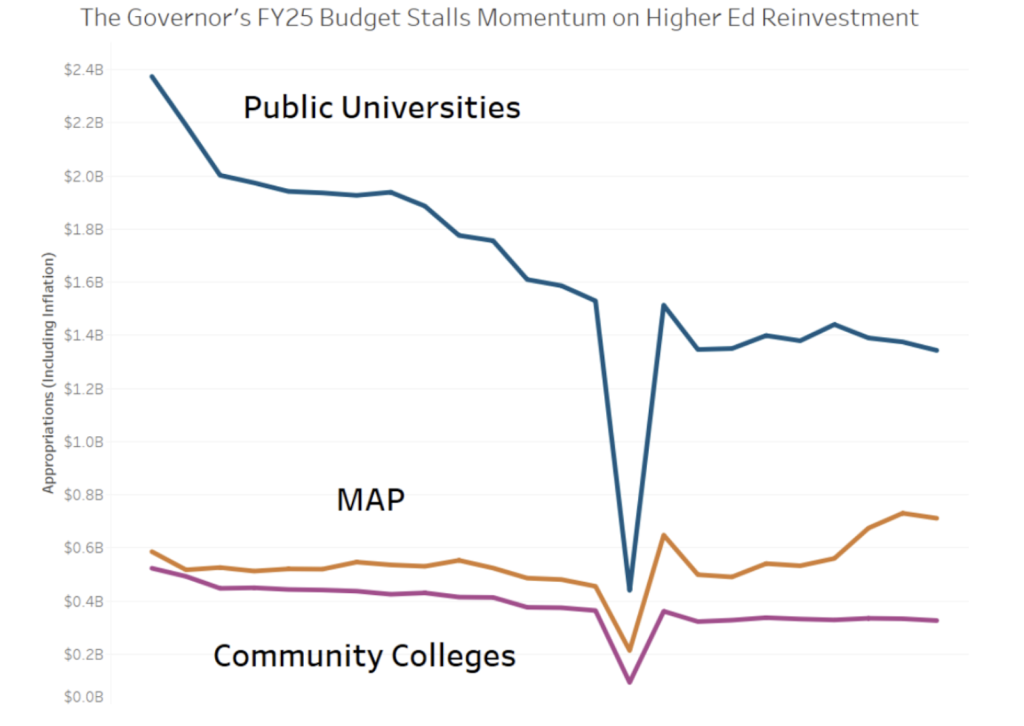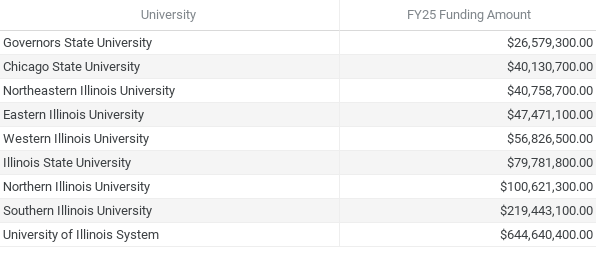After three years of substantial reinvestment by the JB Pritzker administration in the Monetary Award Program (MAP) and in appropriations to state universities, the Partnership for College Completion (PCC) remains disappointed that this year’s legislative session stalled the progress the state has begun to make in higher education recently. The budget features minimal increases in state appropriations to colleges and universities and a minimal increase in MAP funding that fails to keep pace with inflation. Though there are many evidence-based reforms the state could have implemented to address systemic barriers in higher education, few of these policy changes passed through the General Assembly.

Despite the current Governor’s past efforts to make higher education affordable and accessible, this year’s budget does not advance these critical goals. The future health and equity of Illinois’ economy depends on bold and significant investment in education, even in tough budget years.
The budget process was arduous, nearly collapsing before a marathon overnight session in which Illinois House Democrats finally secured approval. It took three attempts to gather the necessary 60 votes for a budget that includes over $1.1 billion in revenue increases, such as tax hikes on sportsbooks and businesses, which are essential for balancing the $53.1 billion FY25 spending plan.
The budget’s passage presents financial challenges for both students and institutions. MAP grants will increase by just $10 million, potentially reducing aid amounts relative to inflation. This underfunding comes as students and universities face increased financial uncertainty with the Free Application for Federal Student Aid (FAFSA) process due to ongoing technical issues, resulting from an attempt to simplify the application.

These challenges jeopardize the college aspirations of students, likely contributing to 12,400 fewer Illinois high school seniors filling out the FAFSA relative to this time last year, according to NCAN’s FAFSA tracker. They also threaten college enrollment just as institutions are recovering from pandemic-induced declines, potentially causing budget shortfalls and financial instability, particularly for schools that rely more on state aid and disproportionately serve Black, Brown and low-income students, like Chicago State University, Northeastern Illinois University and Governor’s State University.
In the FY25 budget, public colleges and universities received a modest two percent increase in funding, which failed to address existing inequities in funding distribution. Community colleges are currently underfunded by $637 million annually relative to what their formulas calculate need to be, so a $6.2 million increase will not make a dent in this gap or address increasing costs due to inflation. Illinois’ public community colleges and and universities urgently need additional funding to address access, affordability, persistence and completion issues.
Legislation details
Throughout the session, PCC supported legislation to make higher education more affordable and equitable. SB 3081 passed both houses and requires all public Illinois universities to waive the undergraduate transfer admission fee and recommends they do so permanently. The bill now awaits the governor’s signature.
There was additional potential for more progress on transfer requirements. SB 3594 would have required institutions to submit and maintain at least one core course to the Illinois Articulation Initiative (IAI), but the language requiring them to do so was removed. SB 0467 would have required common course numbering across institutions but stalled out in the Senate.
Budget Details
Last year, Pritzker’s FY24 budget provided a historic 12.4 percent increase in higher education funding, including $100 million more for MAP and $80 million for public universities, with community colleges receiving an additional $19.4 million. After two decades of decline, the FY25 budget halts last year’s momentum, which is crucial for ensuring continued growth for postsecondary students.
Illinois must fund its public four-year colleges and universities equitably to support higher education effectively. This spring, the Commission on Equitable Higher Education Funding, co-chaired by Senate Majority Leader Kimberly Lightford and Representative Carol Ammons, recommended a new state funding formula to provide equitable, adequate and stable funding for public universities. In the next legislative session, PCC will build on its current efforts to demonstrate to lawmakers the critical importance of codifying the Commission’s recommendations. This historic legislation is vital for Illinois’ future, its college students and the public universities that serve them.
Passing these recommendations into law will help end the cycle of fluctuating investment in higher education. PCC, alongside its partners, will work tirelessly to show lawmakers and the public why these recommendations are crucial for the state’s future.
FY25 Higher Education Budget Highlights
- An increase of $10 million for MAP, totaling $711.6 million. This proposed funding represents a 1.4 percent increase from FY24.
- Since 2019, there has been a $310 million, or 77 percent, increase in investment
- A two percent ($24.6 million) general funds increase for public universities and $6 million increase for community college operating costs
- Additional appropriation details for Higher Education in the FY25 budget can be found here.
While proud of the state’s ongoing efforts to ease the path toward a college degree for all students, PCC is focused on the work to pass the Commission’s recommendations into law to bring an evidence-based and student-centered approach to higher education investment. This ambitious legislation is the next critical step for lawmakers to ensure Illinois’ higher education system transforms students’ lives and enhances the state’s economic vitality.
To learn more about PCC’s leadership on this groundbreaking formula, contact Christian Perry, PCC Director of Policy and Advocacy, at christian@partnershipfcc.org or visit our website.

